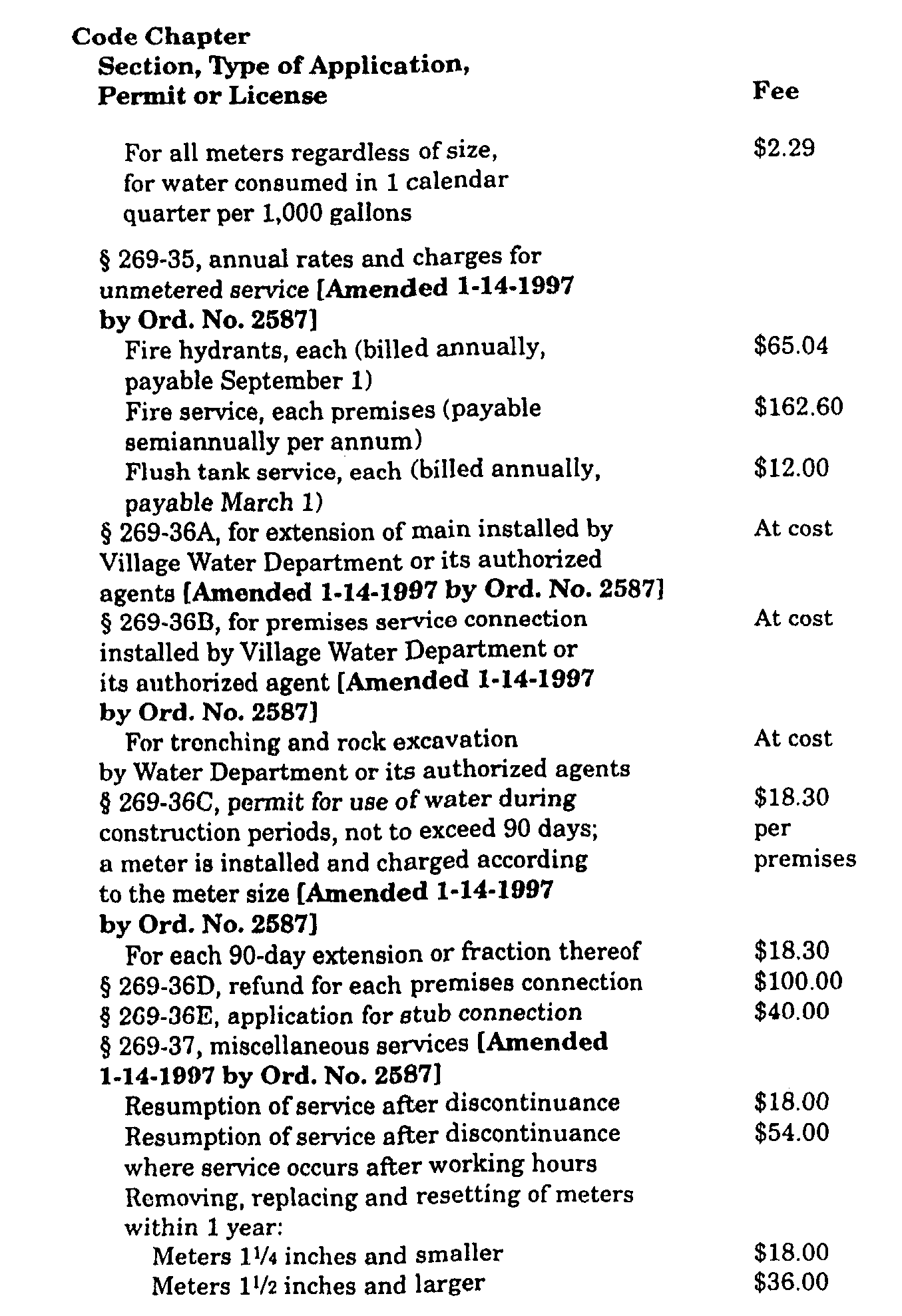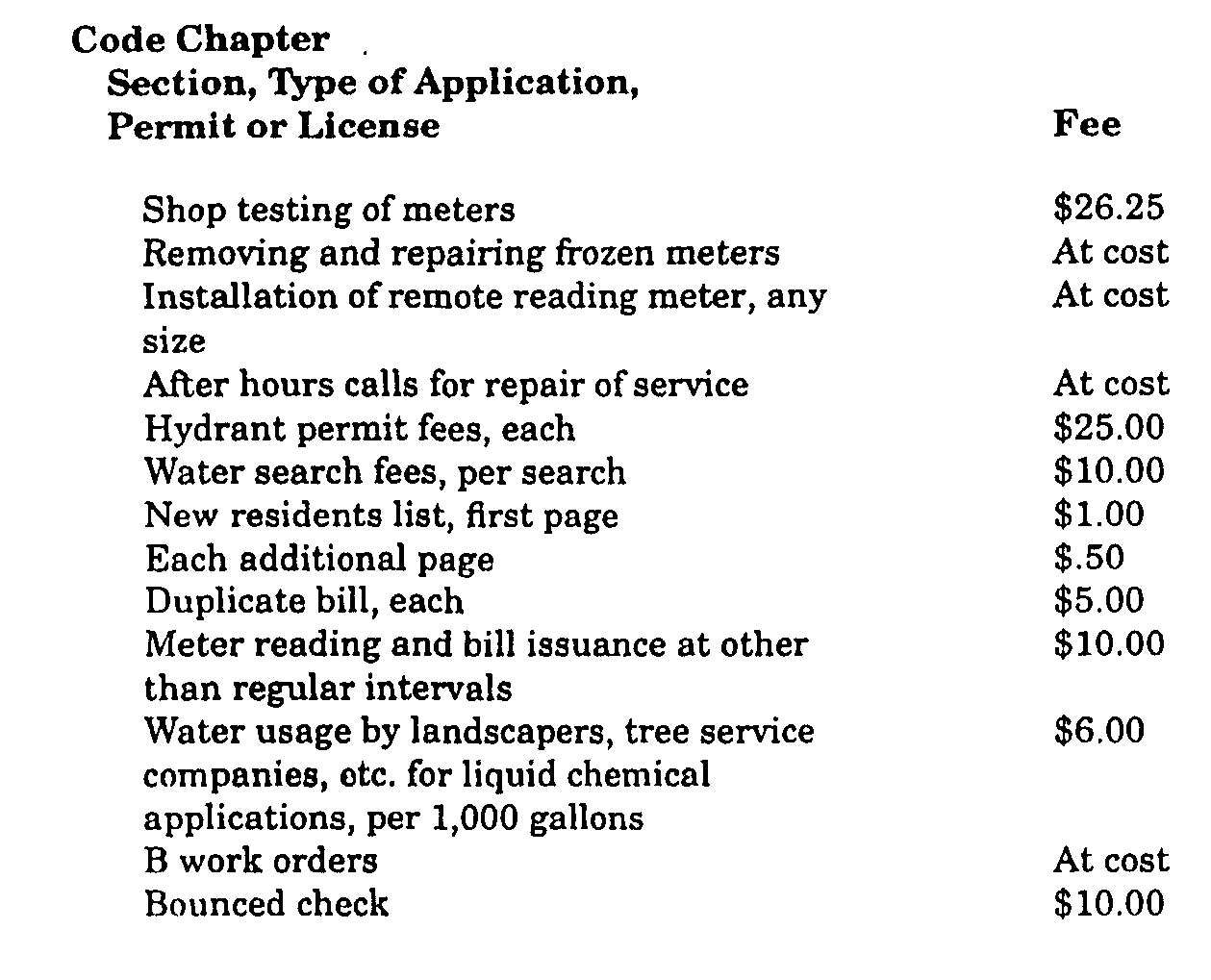

There shall be a late charge of twenty-five dollars ($25.) assessed in addition to the fee set forth in Chapter 145 of the Ridgewood Village Code for applicants who apply for their licenses more than thirty (30) days after the due date, as follows:�
A. Affected fees in § 145-5, General fees, are as follows:�
(1) Nursery school.�
(2) Food and beverage vending machine, per machine.�
(3) Hot tubs.�
(4) Swimming pools.�
(5) Camps.�
B. Affected fees in § 145-6, Enumeration of fees relating to Code chapters, are as follows:�
(1) All fees collected pursuant to Chapter 117, Businesses and Occupations, of the Ridgewood Village Code.�
(2) All fees collected pursuant to Chapter 156, Food and Food-Handling Establishments, of the Ridgewood Village Code.�
(3) All fees collected pursuant to Chapter 165, Garbage, Rubbish, Refuse and Recycling, of the Ridgewood Village Code.�
�
A. Purpose. In Holmdel Builder's Association v. Holmdel Township, 121 N.J. 550 (1990), the New Jersey Supreme Court determined that mandatory development fees are authorized by the Fair Housing Act of 1985, N.J.S.A. 52:2713-301 et seq., and the State Constitution subject to COAH developing rules. The purpose of this section is to establish standards for the collection, maintenance ant! expenditure of development fees pursuant to COAH's rules. Fees Collected pursuant to this section shall be used for the sole purpose of providing low- and moderate-income housing. This section shall be interpreted within the framework of COAH's rules on development fees.�
B. Applicability; exemptions.�
(1) Developers of residential development which creates a new housing unit or units shall pay a development fee.�
�
(2) Developers of any nonresidential development which results in an increase in equalized assessed property value shall pay a development fee.�
(3) Developers of low- and moderate-income housing units shall be exempt from paying development fees for any development providing such housing units.�
(4) Developers that have received preliminary or final approval prior to the effective date of this section shall be exempt from paying a development fee, unless the developer seeks a substantial change in the approval.�
(5) Developers otherwise exempt by law from paying fees required by this chapter shall also be exempt from paying a development fee pursuant to this section.�
C. Amount of Fees�
1) Residential development fees. For applicable residential developments, developers shall pay a development fee of 1 % of the increase in the equalized assessed value of the property resulting from such development. If a D variance is granted pursuant to N.J.S.A. 40:55D-70d (5), then the additional residential units realized (above what is permitted by right under the existing zoning) will incur a bonus development fee of 6% rather than the development fee of 1 %. However, if the zoning on a site has changed during the two-year period preceding the filing of the D variance application, the base density for purposes of calculating the bonus development fee shall be the highest density permitted by right during that two years preceding the filing of the D variance application.�
(2) Nonresidential development fees. For applicable nonresidential development, developers shall pay a fee of 2% of the increase in the equalized assessed value of the property resulting from such development. If a D variance is granted pursuant to N.J.S.A. 40:55D-70d(4), then the , additional floor area realized (above what is permitted by right under existing zoning) will incur a bonus development fee of 6% rather than the development fee of 2%. However, if the zoning on a site has changed during the two-year period preceding the filing of the D variance application, the floor area for purposes of calculating the bonus development fee shall be the highest floor are permitted by right during that two years preceding the filing of the D variance application.�
**Webmasters Note: The previous subsection (C) has been amended as per Ordinance No. 3054.�
D. Collection of fees.�
(1) Developers shall pay fifty percent (50%) of the calculated development fee to the Village of Ridgewood at the time of issuance of building permits. The development fee shall be estimated by the Tax Assessor prior to the issuance of building permits.�
(2) Developers shall pay the remaining fifty percent (50%) of the fee to the Village of Ridgewood at the time of issuance of certificates of occupancy. Prior to the issuance of certificates of occupancy, the Tax Assessor shall calculate the equalized assessed value and the appropriate development fee. The developer shall be responsible for paying the difference between the fee calculated at the time of issuance of the certificate of occupancy and the fee calculated at the time of the time of issuance of the building permit.�
E. Housing trust fund.�
(1) There is hereby created an interest-bearing housing trust fund in a bank to be selected by the Village's chief financial officer for the purpose of receiving development fees from residential and non-residential developers. All development fees paid by developers pursuant to this section shall be deposited in this fund. No money shall be expended from the housing trust fund unless the expenditure conforms to a spending plan approved by COAH.�
(2) If COAH determines that the Village of Ridgewood is not in conformance with COAH's rules on development fees, COAH is authorized to direct the mariner in which all development fees collected pursuant to this section shall be expended. Such authorization is pursuant to this section, COAH's rules on development fees and the written authorization from the Village Council to the selected trust fund bank.�
F. Use of funds.�
(1) Money deposited in a housing trust fund may be used for any activity approved by COAH for addressing the Village of Ridgewood's low- and moderate-income housing obligations. Such activities may include, but are not necessarily limited to, housing rehabilitation; new construction; regional contribution agreements; the purchase of land for low- and moderate-income housing; extensions and/or improvements of roads and infrastructure to low- and moderate-income housing sites; assistance designed to render units to be more affordable to low- and moderate-income households; and administrative costs necessary to implement the Village of Ridgewood's housing element. The expenditure of all money shall conform to a spending plan approved by COAH.�
(2) The Village of Ridgewood will dedicate not more than twenty percent (20%) of development fees collected each year for administrative purposes, including, but not limited to, salaries and benefits for Village employees or consultant fees necessary to develop or implement a rehabilitation program, a new construction program, amendments to the housing element, and an affirmative marketing program. Administrative funds may be used for: income qualification of households, monitoring the turnover of sale and rental units, and compliance with Council monitoring requirements. Development fees shall not be used to defray the costs of existing staff.�
(3) The Village of Ridgewood will devote at least thirty percent (30%) of development fees collected each year to render units more affordable, including, but not limited to down payment assistance, low interest loans and rental assistance.�
(4) No development fees shall be expended to reimburse the Village for housing activities which occurred prior to the effective date of this section.�
G. Expiration of section. This section shall expire if:�
�
(1) COAH dismisses or denies the Village of Ridgewood's petition for substantive certification.�
(2) COAH revokes substantive certification or its certification of this section.�
**Webmasters Note: The previous section has been added as per Ordinance No. 2802.�